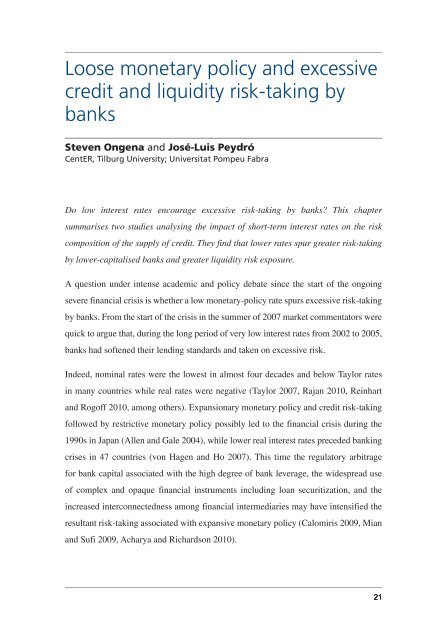Create successful ePaper yourself
Turn your PDF publications into a flip-book with our unique Google optimized e-Paper software.
Loose monetary policy and excessive<br />
credit and liquidity risk-taking <strong>by</strong><br />
banks<br />
Steven Ongena and José-Luis Peydró<br />
CentER, Tilburg University; Universitat Pompeu Fabra<br />
Do low interest rates encourage excessive risk-taking <strong>by</strong> banks? This chapter<br />
summarises two studies analysing the impact of short-term interest rates on the risk<br />
composition of the supply of credit. They find that lower rates spur greater risk-taking<br />
<strong>by</strong> lower-capitalised banks and greater liquidity risk exposure.<br />
A question under intense academic and policy debate since the start of the ongoing<br />
severe financial crisis is whether a low monetary-policy rate spurs excessive risk-taking<br />
<strong>by</strong> banks. From the start of the crisis in the summer of 2007 market commentators were<br />
quick to argue that, during the long period of very low interest rates from 2002 to 2005,<br />
banks had softened their lending standards and taken on excessive risk.<br />
Indeed, nominal rates were the lowest in almost four decades and below Taylor rates<br />
in many countries while real rates were negative (Taylor 2007, Rajan 2010, Reinhart<br />
and Rogoff 2010, among others). Expansionary monetary policy and credit risk-taking<br />
followed <strong>by</strong> restrictive monetary policy possibly led to the financial crisis during the<br />
1990s in Japan (Allen and Gale 2004), while lower real interest rates preceded banking<br />
crises in 47 countries (von Hagen and Ho 2007). This time the regulatory arbitrage<br />
for bank capital associated with the high degree of bank leverage, the widespread use<br />
of complex and opaque financial instruments including loan securitization, and the<br />
increased interconnectedness among financial intermediaries may have intensified the<br />
resultant risk-taking associated with expansive monetary policy (Calomiris 2009, Mian<br />
and Sufi 2009, Acharya and Richardson 2010).<br />
21














